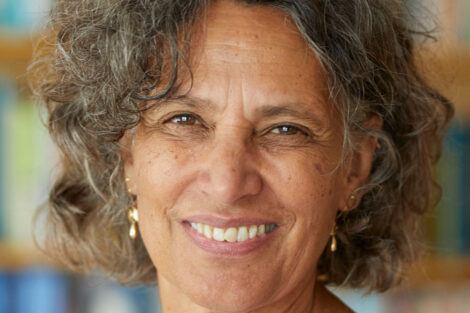September 29, 2021 – Mary Bassett, who joined Harvard University in August 2018 as director of the François-Xavier Bagnoud (FXB) Center for Health and Human Rights at Harvard University and FXB Professor of the Practice of Health and Human Rights at Harvard T.H. Chan School of Public Health, was named commissioner of health of the State of New York by Gov. Kathy Hochul.
Bassett will take a leave of absence from Harvard Chan School starting December 1 to assume the new role. Natalia Linos, currently the FXB Center’s executive director, will serve as acting director during Bassett’s leave.
As New York health commissioner, Bassett will lead the state’s pandemic response while advocating for the well-being of state residents and working to close population health gaps.
For Bassett, the new role is a homecoming on multiple levels: A New York City native, she also served as the city’s health commissioner for four years before joining Harvard Chan School.
“I am humbled and honored to return to my home state of New York to lead the Department of Health at this pivotal time,” said Bassett in a press release from the New York governor’s office. “The pandemic underscored the importance of public health, while also revealing inequities driven by structural racism. As we move to end the pandemic, we have a unique opportunity to create a state that is more equitable for all New Yorkers. I look forward to working toward this with Governor Hochul and the team at the Department of Health.”
Said Hochul, “Our recovery from this pandemic requires tested leadership and experience to improve health equity and access across the state, and Dr. Bassett is perfectly equipped to lead the New York State Department of Health during this critical moment.”
Bassett has more than 30 years of experience in promoting health equity and social justice, both in the U.S. and abroad. Her career has spanned academia, government, and not-for-profit work.
As commissioner of New York City’s Department of Health and Mental Hygiene from 2014 to 2018, Bassett worked to address the structural racism at the root of the city’s persistent health disparities between white New Yorkers and communities of color, and led the Department’s response to Ebola, Legionnaires’ disease, and other disease outbreaks. Prior to serving as commissioner, Bassett was deputy commissioner since 2002. In that role, she oversaw New York City’s pioneering tobacco control interventions and food policy, which included the nation’s first calorie-posting requirements and trans fat restrictions. She also launched district public health offices in several neighborhoods that had long been harmed by racial, ethnic, and economic health inequities, with the goal of reducing the excess burden of disease in those neighborhoods.
From 2009 to 2014, Bassett was program director for the Doris Duke Charitable Foundation’s African Health Initiative and Child Well-Being Prevention Program.
Early in her career, she served for 17 years on the medical faculty at the University of Zimbabwe, where she developed a range of AIDS prevention interventions. She went on to serve as associate director of health equity at the Rockefeller Foundation’s Southern Africa Office, overseeing work on AIDS in Africa. Later, she served on the faculty of Columbia University, most recently in its Mailman School of Public Health. She has received numerous awards and honors.
In a community-wide email, Harvard Chan School Dean Michelle Williams wrote, “I am extremely proud of all that the FXB Center has accomplished under Mary’s unparalleled leadership, with Natalia as her co-pilot on many of the new initiatives, and I look forward to witnessing the center’s continued and growing impact.” She added, “Although we will greatly miss Mary’s strong vision, deep understanding of public health policy, and fierce commitment to equity, we know that these attributes will serve her well in her new role heading New York State’s Department of Health, where she will lead an agency that harnesses the expertise of more than 5,000 colleagues to advocate for the welfare of more than 19 million residents. All of them could not be in better hands.”
photo: Kent Dayton
